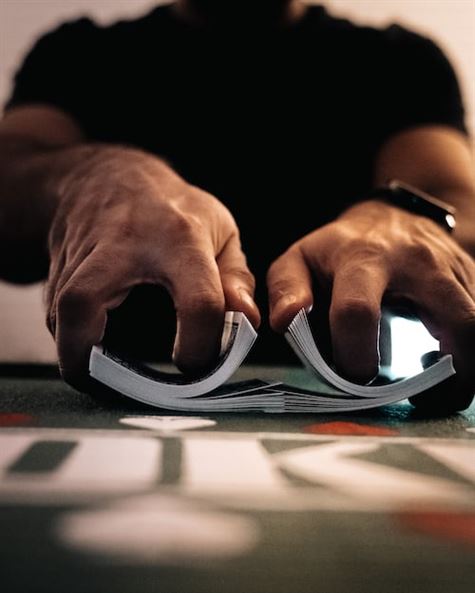Navigating Early Stages: Strategies for Accumulating Chips and Surviving the Bubble is a comprehensive guide that provides valuable insights and strategies for individuals looking to navigate the early stages of a business or investment venture. This guide aims to help readers accumulate chips, or resources, and successfully navigate through the volatile and uncertain early stages of a venture, ultimately surviving the bubble and achieving long-term success.
Effective Bankroll Management Strategies for Poker Players
The early stages of a poker tournament are crucial for building a solid chip stack that can sustain you throughout the game. One of the most important strategies during this phase is to play tight and aggressive. This means being selective with the hands you play and making aggressive bets when you have a strong hand. By playing tight, you minimize the risk of losing chips unnecessarily and increase your chances of winning big pots.
Another effective strategy for accumulating chips in the early stages is to take advantage of your position at the table. Position is a powerful tool in poker, as it allows you to act last and gain valuable information about your opponents’ hands. When you are in late position, you can play a wider range of hands and put pressure on your opponents by making well-timed bets and raises. This can often lead to them folding their weaker hands, allowing you to accumulate chips without even having to show your cards.
In addition to playing tight and taking advantage of your position, it is also important to be aware of the table dynamics. Pay attention to how your opponents are playing and adjust your strategy accordingly. If you notice that a particular player is playing overly aggressive, you can use this to your advantage by trapping them with strong hands or by making well-timed bluffs. On the other hand, if you are up against tight players, you can loosen up your starting hand requirements and steal blinds more frequently.
As the tournament progresses and the bubble approaches, it becomes crucial to adjust your strategy once again. The bubble is the phase of the tournament where players are just a few spots away from making it into the money. During this phase, many players become more cautious and tighten up their play to ensure they survive and cash in the tournament. To take advantage of this, you can become more aggressive and start stealing blinds and antes more frequently. By accumulating chips during the bubble, you increase your chances of making it into the money and securing a profitable finish.
Surviving the bubble also requires careful bankroll management. It can be tempting to take unnecessary risks in order to secure a spot in the money, but it is important to remember that survival should be your primary goal. Avoid getting involved in unnecessary confrontations and focus on preserving your chip stack. By playing tight and selectively, you can increase your chances of making it through the bubble and into the money.
Mastering Bluffing Techniques in Early Stages of Poker Tournaments
One of the most important aspects of bluffing in the early stages of a poker tournament is timing. Bluffing too early or too often can quickly deplete your chip stack and put you at a disadvantage. It is crucial to choose your bluffing opportunities wisely and be aware of the table dynamics. Look for situations where your opponents are more likely to fold, such as when the board shows a potential flush or straight draw. By bluffing in these situations, you can capitalize on your opponents’ fear of losing a big pot and increase your chip stack.
Another key element of successful bluffing in the early stages of a poker tournament is reading your opponents. Pay close attention to their betting patterns, body language, and reactions to the community cards. If you notice that a player tends to fold easily or becomes more cautious when faced with aggressive betting, it may be a good opportunity to bluff. On the other hand, if a player is consistently calling or raising, it is best to avoid bluffing against them, as they are likely to have a strong hand.
In addition to timing and reading your opponents, it is essential to maintain a consistent image at the table. If you are known as a tight player who only bets with strong hands, your bluffs are more likely to be successful. However, if you have been caught bluffing multiple times, your opponents will be more inclined to call your bets, making it harder for you to accumulate chips. Therefore, it is crucial to mix up your play and occasionally show down strong hands to keep your opponents guessing.
Furthermore, it is important to be aware of your chip stack and the tournament structure when bluffing in the early stages. Bluffing becomes riskier as the blinds increase and the bubble approaches. At this stage, players are more likely to call your bets, as they are fighting to survive and accumulate chips. It is advisable to be more selective with your bluffs and focus on preserving your chip stack rather than taking unnecessary risks.
Analyzing Opponents: Reading Poker Players in the Early Stages
One of the first things to look for when analyzing opponents is their betting patterns. Pay attention to how often they bet, the size of their bets, and whether they tend to bet aggressively or passively. This information can give you a sense of their playing style and help you anticipate their moves. For example, if a player consistently makes large bets, it may indicate that they have a strong hand. On the other hand, if a player frequently checks or makes small bets, they may be playing more cautiously and could potentially be bluffing.
Another important aspect to consider is how opponents react to different situations. Do they fold easily when faced with a large bet? Or do they tend to call or raise more often? Understanding how opponents respond to pressure can give you an advantage when playing against them. For instance, if a player folds easily, you can use this information to bluff more often and steal pots. Conversely, if a player is more likely to call or raise, you may want to be more cautious when betting and only do so with strong hands.
Body language and physical tells can also provide valuable information about opponents’ hands. Pay attention to their facial expressions, body movements, and any other signs of nervousness or confidence. For example, if a player suddenly becomes tense or starts fidgeting when they have a strong hand, it could be a tell that they are holding something good. Similarly, if a player avoids eye contact or appears relaxed when they are bluffing, it could be a sign that they are trying to deceive you.
Furthermore, observing opponents’ playing styles can help you identify their strengths and weaknesses. Some players may be more aggressive and willing to take risks, while others may be more conservative and prefer to play it safe. By understanding these tendencies, you can adjust your own strategy accordingly. For instance, if you are up against an aggressive player, you may want to tighten up your starting hand requirements and only play premium hands. On the other hand, if you are facing a more passive player, you can take advantage of their cautiousness by bluffing more often and stealing pots.
Lastly, it is important to remember that analyzing opponents is an ongoing process. As the game progresses, players may change their strategies or adjust their playing styles. Therefore, it is crucial to continuously observe and reassess opponents throughout the tournament. By staying vigilant and adapting to changing circumstances, you can stay one step ahead and increase your chances of success.
Optimal Positioning: Maximizing Chip Accumulation in Early Stages
One of the key strategies for accumulating chips in the early stages is to play a tight and aggressive game. This means being selective with the hands you play and being aggressive when you do decide to enter a pot. By playing fewer hands, you reduce the risk of getting involved in marginal situations and increase your chances of winning pots when you do have a strong hand.
Position is also a crucial factor in chip accumulation. Being in late position allows you to have more information about your opponents’ actions before you have to make a decision. This gives you a significant advantage as you can make more informed decisions and potentially steal pots with weaker hands. Conversely, being in early position puts you at a disadvantage as you have to act before most of your opponents, limiting your options and making it harder to accumulate chips.
Another important strategy for chip accumulation is to take advantage of the tight play of your opponents in the early stages. Many players in the early stages of a tournament are risk-averse and tend to play conservatively. By recognizing this, you can exploit their cautious play by being more aggressive and taking control of pots. This can help you accumulate chips without having to show down strong hands.
Bluffing can also be an effective strategy for chip accumulation in the early stages. By bluffing, you can win pots without having the best hand and keep your opponents guessing about the strength of your holdings. However, it is important to choose your spots wisely and bluff against opponents who are likely to fold. Bluffing too often or against players who are unlikely to fold can backfire and result in a significant loss of chips.
Surviving the bubble is another crucial aspect of navigating the early stages of a tournament. The bubble refers to the point in the tournament where only a few players need to be eliminated before the remaining players are guaranteed a cash prize. During this stage, many players become overly cautious and tighten up their play to avoid being eliminated. This presents an opportunity for aggressive players to accumulate chips by taking advantage of their opponents’ fear of busting out.
In order to survive the bubble, it is important to maintain a healthy chip stack. This means being selective with the hands you play and avoiding unnecessary risks. It is also important to pay attention to the stack sizes of your opponents and adjust your strategy accordingly. If you have a large stack, you can put pressure on shorter stacks and force them to make difficult decisions. Conversely, if you have a short stack, you may need to take more risks in order to accumulate chips and avoid being blinded out.
Adapting to Different Table Dynamics in Early Stage Poker Play
First and foremost, it is important to be patient and selective with your starting hands. In the early stages, the blinds are relatively low, and there is no need to take unnecessary risks. Focus on playing premium hands and avoid getting involved in marginal situations. By being patient, you can wait for strong hands and maximize your chances of winning pots.
However, it is also important to be aware of the table dynamics and adjust your strategy accordingly. If you find yourself at a tight table where players are folding frequently, you can take advantage of this by playing more aggressively. By raising and re-raising, you can steal blinds and antes, accumulating chips without having to show your cards. This strategy can be particularly effective when the blinds are increasing, and players become more cautious.
On the other hand, if you find yourself at a loose table where players are playing a wide range of hands, it is important to tighten up your starting hand requirements. Playing too many hands in this situation can lead to unnecessary losses. Instead, focus on playing premium hands and avoid getting involved in speculative situations. By playing tight, you can wait for strong hands and capitalize on the mistakes of your opponents.
Another important aspect of early stage play is position. Position refers to your position relative to the dealer button, and it can have a significant impact on your decision-making. When you are in late position, you have the advantage of acting last, which allows you to gather more information about your opponents’ hands. This information can be crucial in making informed decisions and maximizing your chances of winning pots. Therefore, it is important to play more hands in late position and be more cautious in early position.
Furthermore, it is important to be aware of the bubble and adjust your strategy accordingly. The bubble refers to the point in the tournament where only a few players need to be eliminated before the remaining players are guaranteed a cash prize. At this stage, many players become more cautious and tighten up their play to ensure survival. This presents an opportunity for aggressive players to accumulate chips by taking advantage of their opponents’ fear of busting out. By playing more aggressively and putting pressure on your opponents, you can accumulate chips and increase your chances of making it to the money.
In conclusion, navigating the early stages of a poker tournament requires a combination of patience, adaptability, and strategic decision-making. By being patient and selective with your starting hands, adjusting your strategy to the table dynamics, and taking advantage of your position, you can accumulate chips and survive until the bubble. Remember to stay focused, observe your opponents, and make informed decisions based on the information available to you. With these strategies in mind, you will be well-equipped to navigate the early stages of a poker tournament successfully.

















